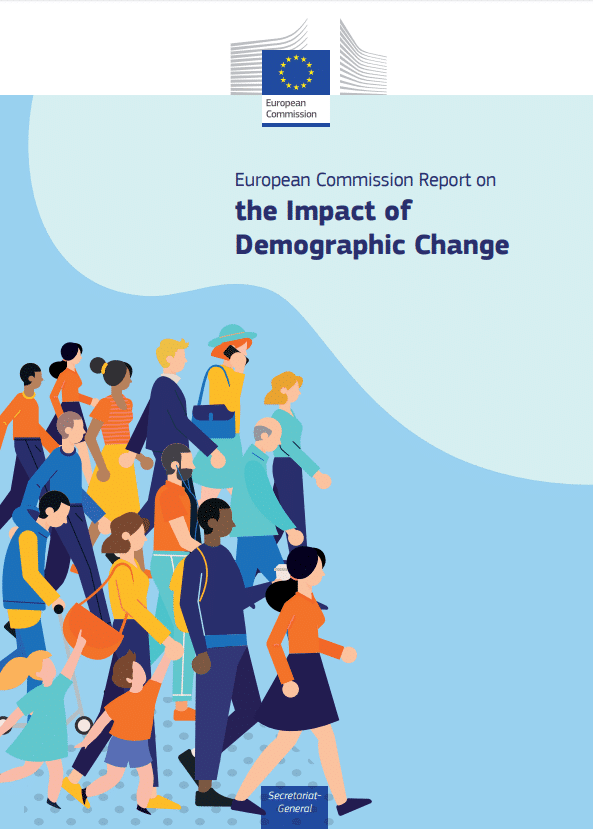
Changing realities of demography in Europe
The increase in life expectancy, lower of birth rates, smaller households and growing urbanisation are reshaping the demographic structures across EU countries and the share of the European population worldwide.
As EU figures demonstrate, people aged 65 years or older should account for 30.3% of the EU population by 2070 (compared to 20.3% in 2019) and people aged 80 years or older for 13.2% (compared to 5.8% in 2019), while Europe’s share of global population is expected to account for less than 4% of the world’s population.
Launch of an EU reflection process
Aware of the pressing demographic challenges, and after open calls made by AGE, the newly elected European Commission President Von den Leyen nominated Dubravka Šuica Vice-President-designate for Democracy and Demography with the mission of ‘Supporting Europe through the demographic transition’. Ms Šuica’s tasks includes an analysis of the impacts of demographic change on different groups in society and on areas and regions, and the publication of a Green Paper on ageing, launching a wide debate on long-term impacts on care and pensions and on the adequacy of our current social protection in the context of an ageing population.
First step: EU report on demographic change

We welcome some strong points in this report, which covers a range of key issues, in particular:
- health and long-term care: the need to deliver a long-term vision for well-performing and resilient public health systems, notably by investing in disease prevention and surveillance, and improving access to healthcare, diagnosis and treatment for all. A clear reference is made here to the European Pillar of Social Rights, notably its principle 18 dedicated to long-term care
- Employment: need for policies to make labour market more inclusive, improve work-life balance and enable people to work longer in promoting health at work, investing in upskilling and recognising new skills and qualifications
- Gender: the gender perspective is not only covered in the area of employment but also in relation to old age income and old age poverty.
- Intergenerational fairness in relation to social protection systems: the report highlight the fact that the social protection systems will face major challenges, including to ensure fairness across generation. It is indeed an important point to be taken into account to address this challenge is a comprehensive way, from a life course perspective approach and by preventing any generational divide.
- Opportunities offered by older persons: the report indicates that the Green paper on ageing is going to address how the EU can make the most of the opportunities offered by older persons especially in relation to the Silver Economy.
- The regional approach is a strong dimension, namely the access to services in rural areas, isolation and digital exclusion.
- Last but not least the reports considers the intertwin between the digital and green transition, and the demographic challenge – a comprehensive approach that is crucial to deliver fair and sustainable solutions across generations.
However we have identified a number of serious shortcomings that would also need to be addressed if we really want to achieve the objective of achieving a transition that is truly inclusive and leaves no one behind:
- The rights-based approach on which we have been insisting for quite a few years now is missing, despite the numerous official statements – including from Commissioner Dalli – during the COVID-19 underlying that human rights are valid also for older persons.
- The European Pillar of Social Rights is referred to, but should be considered across domains and not only in relation to long-term care.
- Older informal carers are overlooked, e.g. in relation to work-life balance.
- Within long-term care, palliative and end-of-life care are not addressed.
- An ageing population will increasingly raise the question of how to better respect dignity in old age and fight elder abuse, yet this is not even mentioned in the Commission’s report.
- The approach of Silver Economy is too narrow: it considers older persons only as consumers and tend to limit this area to health and long-term care. It should also include the assets and active involvement of older persons, including as entrepreneurs
- There is no mention of age-friendly environments. Yet, as WHO work has also demonstrated, the role of supportive environments is key to prevent dependency in older age. Accessibility through a Design for All approach and rehabilitation are also strong tools to foster healthy, active and independent ageing.
- The solidarity between generations should be addressed beyond the issue of social protection systems.
- There is no intersectionality perspective, apart from the gender perspective
- The report shows a clear need to work more on data collection and statistics.: there are data gaps to be addressed, for example, clear figures across the EU on older persons with disabilities, in relation to violence against women data are collected up to the age of 74, and there is no recent data on elder abuse. On top of those gaps, there is also a need for a paradigm shift in relation to the way some data are named: for instance, the dependency-ratio conveys a negative message around ageing.
Conclusion: need to widen the scope of the debate
The European Commission’s report is a first step to reflect on ageing demography and its impact on employment, social protection, health and long-term care. Yet we hope that the upcoming Green Paper on Ageing will trigger a wider reflection, building also on the lessons learned from the COVID-19 outbreak.
AGE will advocate towards the European Commission in relation to the Green paper on Ageing building on its wide and strong expertise across domains, and work with its members as well as with key EU stakeholders.
> Access the European Commission’s Report on the Impact of Demographic Change in Europe






